QuestionI addopted a kitten from the shelter. They spayed her- she is 2.5 months old. I picked her up from the vet- she came home a little dazed from the medicine. She was using the litterbox fine. A couple days later I noticed her stitches were swolen and infected looking- I took her back to the vet- they cleaned her up- re- stitched, and gave me antibiotics to give to her (this time they gave me a cone for her head). she was eatting fine that day- but peaing and pooping all over the place. Yesterday she stoped eatting- she would drink a little water- shes been sneezing-and breathing funny. I've forced water down her throat- tried to feed her tuna- taken her in the bathroom and let the warm shower clear her stuffy nose. should i take her back to the vet? any advice?
AnswerLaura,
The Elizabethan collar (cone) is intended to prevent your little one from picking at her stitches. It is quite possible that she may have torn stitches out which would explain why the vet placed new sutures in her tummy and prescribed antibiotics to try and prevent/contain any possible infection. In terms of wound care for your kitten's spay incision I would suggest that you check her belly a few times daily to watch for signs of healing as well as making sure to keep an eye out for any further infection. The fact that your kitten has stopped eating would suggest that something more serious is going on. If it is difficult for your kitten to get into and out of her litter pan and eat or drink it might be best to allow her to have the collar off for short, supervised periods of time...You could opt to seek a second veterinary opinion to make sure that your little one isn't more seriously ill than the first vet thought.
A 10 week old kitten who isn't eating, drinking and playful is concerning. It's possible that the antibiotics are affecting your kitten's appetite. A common issue with antibiotics is that they are designed to kill bacteria. That means that they don't distinguish between bacteria that cause infections and the normal beneficial bacteria normally found in the digestive tract which commonly cause side effects such as nausea, vomiting, decreased appetite and diarrhea. The most effective home remedy to counteract the negative side effects of antibiotics is to make sure that you replace them. A simple and cost effective way to replace beneficial bacteria is to use the good bacterial cultures found in yogurt because they are similar to those found in the normal digestive tract. I recommend that you use a plain, unsweetened, organic (if at all possible) yogurt with live bacterial cultures (Lactobacillus and acidophilus) to help your little one be more comfortable and start eating, drinking and functioning normally again. Your kitten may readily accept the yogurt, but some cats don't. The best way to ensure that she gets enough live cultures back in her digestive tract is to give her a dosage of about 2-3 teaspoons of yogurt twice a day with an oral syringe (Commonly used to give liquid medicines to human babies. You can find these syringes in the baby aisle of your local pharmacy, I don't recommend that you reuse an oral syringe because many human medications are toxic to cats even in small amounts.) You should notice a difference in her appetite and willingness to drink enough. I don't generally recommend that kittens be force fed water without a vet's recommendation because they can choke. Proper techniques are important with any force feeding.
Your vet should be made aware that your kitten is urinating and defecating outside of the litter box. It's quite possible that it is a question of your kitten not feeling well and having difficulty controlling her bladder and bowel functions enough to get to the litter in time. You should rule out any possibility of medical issues being the cause of the litter box issues before trying to correct the behavior. In the meantime I would recommend that you use an enzymatic cleaner to clean the places where she has urinated/defecated. An enzymatic cleaner uses beneficial bacteria that remove stains and odors from biological substances like urine, feces and vomit. I use a great product called Petzyme, it is also formulated to add to your wash if you need to do so and I have found it to be highly effective and safe for most surfaces in my home.
The sneezing and congestion that you mention could be an upper respiratory infection due to the stress of being in a shelter or being spayed. It is very important to make sure that your kitten doesn't have distemper which is a severe upper respiratory virus that can be fatal. Run of the mill upper respiratory infections are quite common in shelter environments due to serious overcrowding. The kitten's vaccines may have been given while she was incubating an infection and several combined factors have led to her not feeling well. Some shelter systems don't make a practice of screening for serious chronic health conditions prior to adoption so it is important to check into the normal protocol the shelter that you adopted your baby from. If your kitten hasn't been screened for routine health problems and treated for any internal/external parasites it is worth taking the time and expense to be sure that your little one is tested for serious chronic health issues including feline leukemia and FIV. These serious illnesses often act similarly to HIV and AIDS in people and can sometimes reduce a cat's life span and quality of life so it is important to rule these issues out.
It's a good idea to purchase a digital thermometer at your local pharmacy so that you can take her temperature. Normal body temperature for cats is between 100.5 and 102.5 Fahrenheit. You can use a human rectal thermometer, but be sure that you keep it separate from the thermometers that your family uses. I would suggest that you use a water based lubricant to insert the thermometer, KY jelly works well. You only want to insert the thermometer an inch to an inch and a half into your kitten's rectum. Be absolutely sure that the kitten is being held securely to prevent serious injury to her intestinal tract. If the thermometer reads 103 F or above you will need to take her to the vet as soon as possible.
In the meantime I would recommend that you use sterile gauze pads moistened with warm water to wipe away any discharge from your baby's nose and mouth to help her be more comfortable. Monitor her temperature and write it down a couple of times a day to be sure that she isn't running a high fever. Baby your little kitten for now by offering things that are easy to eat and readily accepted by most cats. I would recommend either giving your little girl commercially available meat and broth based baby foods (make sure there aren't any garlic/onions, spices) or making your own by poaching a chicken breast/steak and using the leftover water to puree the meat to about the consistency of cooked cream of wheat. Given that your little munchkin isn't feeling so hot right now I would suggest that you offer about 2 teaspoons of pureed meat every two hours or so in addition to the plain yogurt. I do think that a second vet's opinion wouldn't hurt to confirm that all your kitten needs is some supportive care and TLC. It is going to take more than a hot shower to unplug your little one's nose, especially if she has other health issues beyond the complications of her surgery and an upper respiratory infection.
If your kitten is seriously dehydrated more than water is needed to fix that, water is only a part of proper hydration, electrolytes may be out of balance which can contribute to your kitten feeling unwell. Your vet may want to give your little one subcutaneous (aka sub-q) fluids to rehydrate her slowly over a period of several hours. Sub-Q fluids may help flush out anything that is making your little one feel rotten as well as serving to slowly rehydrate her and keep her properly hydrated. IV or Sub-Q fluids are often given to restore proper electrolyte levels and I wouldn't be surprised if the vet that you get a second opinion from admits your kitten to the hospital simply to make sure nothing serious happens in addition to the other issues that your kitten is being treated for. I wouldn't suggest that you continue or resume force feeding water without your vet's recommendation simply because water alone may not be enough to normalize the electrolyte balance and correct any other potential blood chemistry imbalances. A little bit of patience will go a long way in addition to a thorough physical check up that may include blood tests to check for any abnormalities and a urinanalysis to be sure that your baby doesn't have a bladder infection. I wouldn't be surprised if the vet also analyzes a fecal sample to be sure that internal parasites aren't contributing to how rotten she is feeling right now.
The most important need that your kitten has at this point is to be kept comfortable. Rest, continuing the antibiotics that were prescribed for your kitten(unless the vet opts to discontinue them) as well as small frequent meals of highly palatable and easily digested food, and replacing beneficial bacteria in your little one's digestive tract along with good follow up vet care are all important contributions to your kitten's recovery at this time. I would think that with your vet following your kitten's progress in addition to the other things that I have mentioned your little girl should come around fairly quickly. It's quite possible that the vet may admit your kitten to the hospital for closer observation just to be sure that she is getting better. I hope that you have found this information helpful. If you have any further questions or concerns, or you would simply like to send pictures or updates my way, please don't hesitate to contact me again.

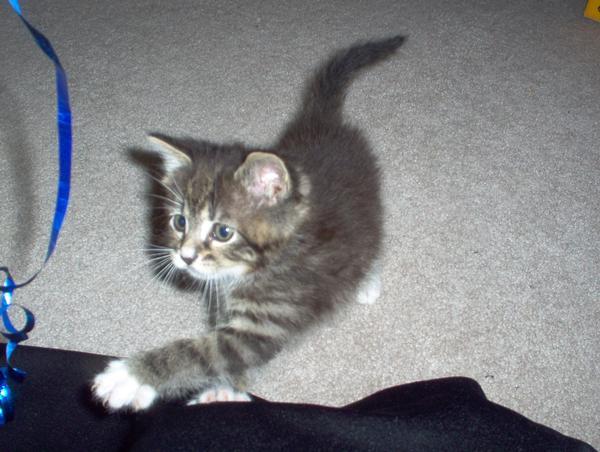 runts
Question
stubby(my cat)
Can the mother chew off
runts
Question
stubby(my cat)
Can the mother chew off
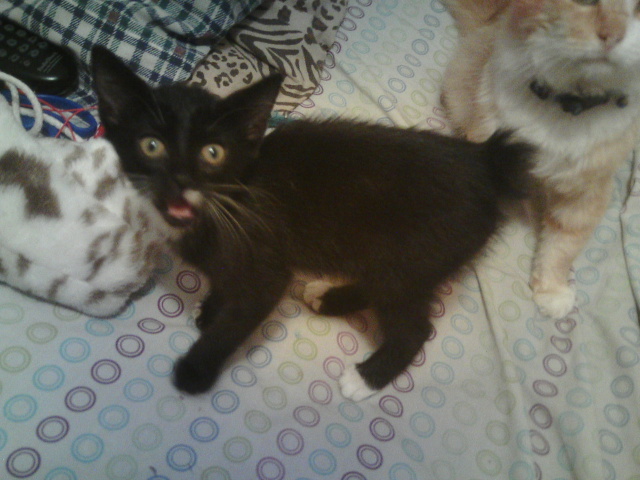 what breed is my bobtail kitten?
Question
Midnight
About a month ago I got a little bobt
what breed is my bobtail kitten?
Question
Midnight
About a month ago I got a little bobt
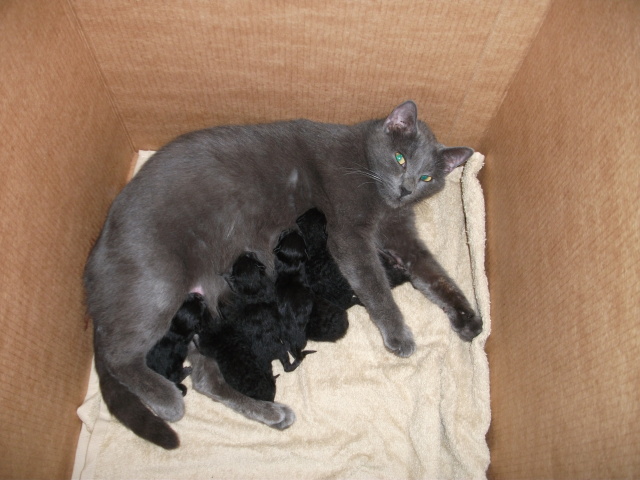 Litter of 9 kittens, born 2/05/10
Question
Smoke and babies
Although we have had 2 adult
Litter of 9 kittens, born 2/05/10
Question
Smoke and babies
Although we have had 2 adult
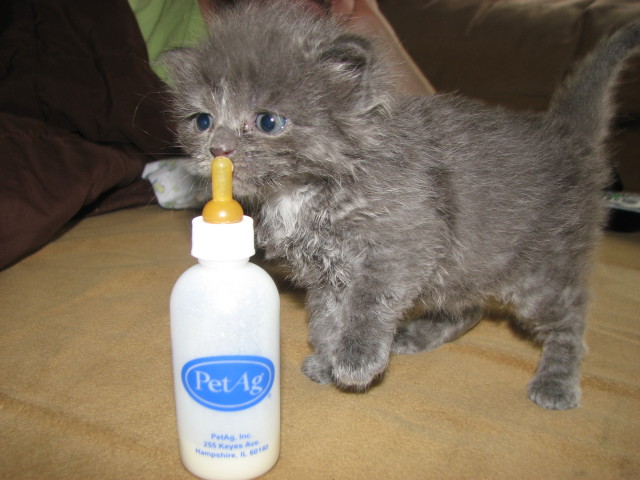 bottle feeding orphan kitten.
QuestionQUESTION: I rescued my kitten when he was 2 wee
bottle feeding orphan kitten.
QuestionQUESTION: I rescued my kitten when he was 2 wee
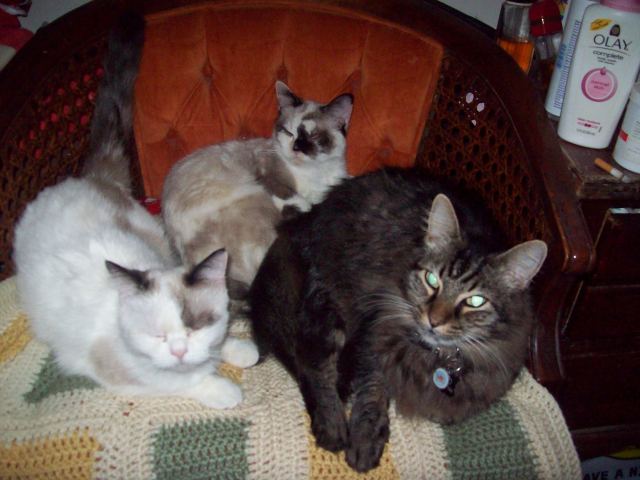 Litter Box Behaviour
Question
All Kitties
Hello!
Im writing to you fo
Litter Box Behaviour
Question
All Kitties
Hello!
Im writing to you fo